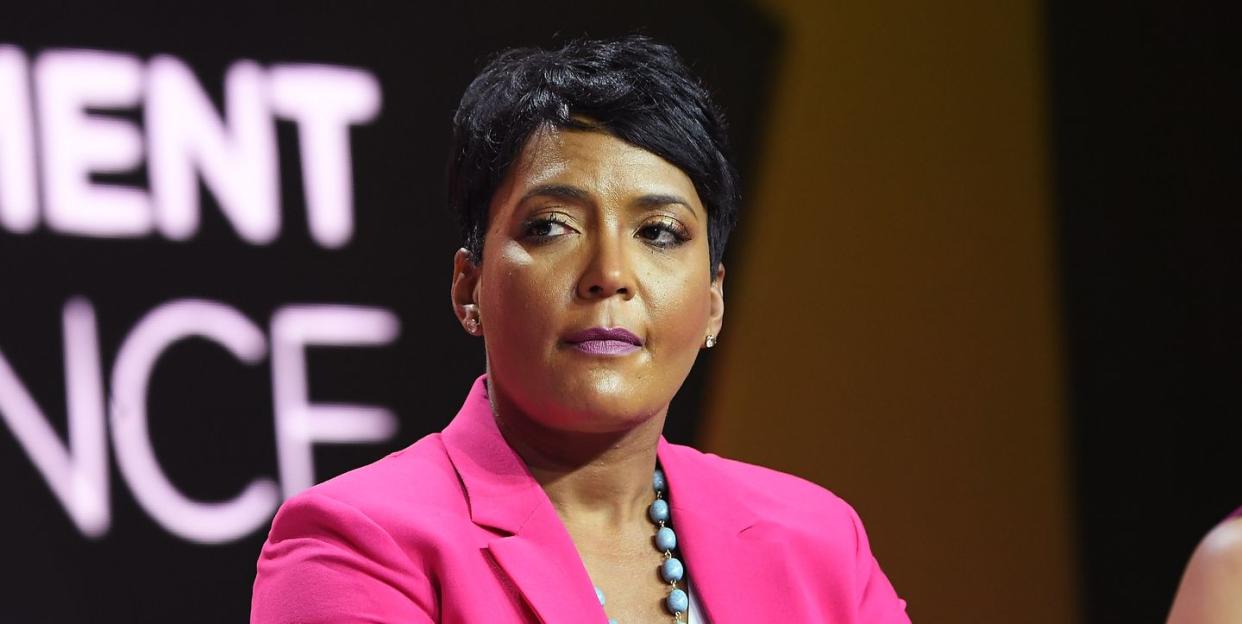Keisha Lance Bottoms Says It's Time to Restore "Moral Leadership" in America

Oprah hosted Where Do We Go From Here?, a two-part town hall event addressing systemic racism in the United States.
She was joined by notable Black figures like Atlanta mayor Keisha Lance Bottoms, actor David Oyelowo, and director Ava DuVernay.
At the end of part two, the town hall participants all answered the major question: Where do we go from here?
Where Do We Go From Here?, Oprah's two-part town hall addressing systemic racism in the United States, began with conversations she was having with friends about this cultural moment, and the change that may finally emerge as a result.
"For the first time it feels like a lot of people are waking up and recognizing that we can do better. The question is, will we do better, as Maya Angelou always said," Oprah said.
At the end of the two-part special, the roundtable's 10 participants finally answered the question the title asked: Where do we go from here? "What is the mayday call? What should be urgent for us, right now?" Oprah said. Each of the participants gave a different answer, demonstrating the sheer breadth of reform that can, and should, take place to create a more equal society.
For Atlanta mayor Keisha Lance Bottoms, the most pressing urge is restoring moral leadership. "My mother recently said to me that this America didn't feel like 1965 to her. It felt like something before 1965. It's important that we restore moral leadership in this country," Bottoms said.
Bottoms then provided a checklist for how audiences, at home, could become leaders in this moment. "Each of us needs to commit that nine people are registered to vote, that nine people fill out their census form, and that we also write down nine things that we want to see changed in our communities," Bottoms said, with each directive representing a minute that officer Derek Chauvin's knee was on George Floyd's neck.
Politician Stacy Abrams also offered three action points: Passing the HEROES Act, which would authorize further stimulus payments and ensure a safe presidential election; filing out the census; and voting. "Vote like your life depends on it, because as we see, it does," Abrams, who ran for governor of Georgia, said.
The "asks" of other participants, like actor David Oyelowo, focused on the big picture, and would require a dismantling of systems.
Earlier on in the town hall, Oyelowo expressed the fear that he could no longer protect his four children from the police, after seeing the video of George Floyd's killing at the hands of a police officer. Unsurprisingly, the actor's biggest concern is police reform. "How does this not happen again? What has to happen with the police?" Oyelowo asked.
Reporter Nikole Hannah Jones agreed. "We need to reform police departments so that they are not occupying Black communities but serving Black communities. What I hear from Black communities is that they do want policing, but they want the policing that white people get," Hannah-Jones said, while stressing the need for economic and educational reform as well.
A first step may be knowing, exactly, how police officers perceive their communities. Jennifer L. Eberhardt, the author of Biased, develops implicit bias trainings for schools, workplaces, and police forces. Now, she's working on a metric to gauge their efficacy.
New York Times op-ed columnist Charles M. Blow had a simple, and straight-to-the-point response: "I think we need a Civil Rights Bill 2020. It is a broad concept, and we shouldn't be shy about being bold," Blow said. "This is about making government function as well for you as it does for someone on the other side of town. The only way you get there is through bold action."
Ibram X. Kendi, author of the bestselling book How to Be an Antiracist, expressed a goal that aligns with his work as a scholar of racism: "The ask is building an antiracist America," Kendi said, while acknowledging it will be an uphill fight. "We have a nation where racism is everywhere, and people believe it should be that way. They believe Black people should be poor. They believe they have more because they are more," Kendi said. Building an antiracist America will take dismantling that framework.
Other participants emphasized the power the media has in furthering the Black Lives Matter movement. NAACP's Rashad Robinson pointed out that many works of TV and film are set in an idealized world, seemingly free from racism. "We have to challenge the type of images that come into our home," Robinson said.
Ava DuVernay, a film director, agreed with the importance of narrative—which is why she started the Law Enforcement Accountability Project, along with other creators. "We'll amplify the identification of cops who kill Black people. It's using art to make sure we remember their names and faces, with the hope of accountability," DuVernay said.
The event concluded with a powerful invective from Bishop William J. Barber II, who directed the conversation toward the pandemic. "The pandemic has exposed that America has two great wounds. The wound of racism, and the wound of poverty," Barber said.
"Before George [Floyd} got to that corner, he was being suffocated from the policies of this nation. He lost his job in COVID. He didn't have decent unemployment. By the time he got there on that corner, he was already being suffocated by the damages of this society," Barber said.
Barber invited Where Do We Go From Here? audiences to their next virtual engagement: An online March on Washington to address poverty in the United States, featuring Americans of all backgrounds.
For more ways to live your best life plus all things Oprah, sign up for our newsletter!
You Might Also Like

